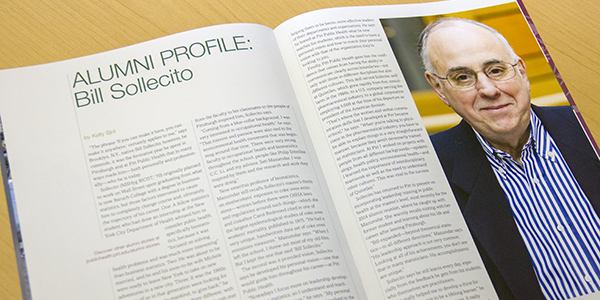
PITT PUBLIC HEALTH MAGAZINE - “The phrase ‘If you can make it here, you can make it anywhere,’ certainly applies to me,” says Brooklyn, N.Y., native Bill Sollecito; however, he contends, it was the formative year he spent in Pittsburgh and at Pitt Public Health that in many ways made him—both personally and professionally—who he is today.
Sollecito (MSHyg BIOST, ’70) originally planned to work on Wall Street upon graduating from what is now Baruch College with a degree in business statistics, but three factors intervened to cause him to completely change course and, ultimately, the trajectory of his career. One: A fellow statistics student who had done an internship at the New York City Department of Health advised him to consider public health, specifically biostatistics, because it was “focused on solving health problems and was much more interesting” than business statistics. Two: He was about to be married, and he and his soon-to-be wife Michele were ready to leave New York to take on new adventures in a new city. Three: It was the 1960s.
“Many of us in that generation were looking for ways to contribute to mankind, to give back,” he says. “I was looking for somewhere different, with a good school of public health, and Pittsburgh met that requirement. It was an ideal setting.”
What followed during his time in the master’s program in the Department of Biostatistics shaped Sollecito—who would later go on to earn his DrPH; help to found the multibillion-dollar, global clinical research company Quintiles (now IQVIA); and return to academia as clinical professor and director of the Public Health Leadership Program at UNC Gillings School of Global Public Health—in three distinct ways.
The first was it provided inspiration. Everyone from the faculty to his classmates to the people of Pittsburgh inspired him, Sollecito says.
“Coming from a blue-collar background, I was very interested in occupational health,” he says. “That interest and passion were also tied to the environmental health movement that was beginning around that time. There were very strong faculty in occupational health and biostatistics throughout the school, people like Philip Enterline, C.C. Li, and my advisor, Sati Mazumdar. I was inspired by them and the research and work they were doing.”
Now emeritus professor of biostatistics, Mazumdar still recalls Sollecito’s master’s thesis on steelworkers’ exposure to coke oven emissions—written before there were OSHA laws and regulations around such things—which she and coauthor Carol Redmond cited in one of the largest epidemiological studies of coke oven workers’ mortality, published in 1975. “He had a very unique, handwritten data set of coke oven emissions measures,” Mazumdar says. “When I left the school, I threw out most of my old files. But I kept the one that said ‘Bill Sollecito.’”
The second was it provided vision. Sollecito says he developed his personal vision—one that would guide him throughout his career—at Pitt Public Health.
“Nowadays I focus more on leadership development than statistics, so I understand and teach the importance of vision,” he says. “My personal vision was all about wanting to be involved in the studies and breakthroughs that would help people. Whether that was through occupational health or later in my career with novel drug development, I was doing it to help people, to find new treatments that would be beneficial.”
Sollecito now teaches leadership to biostatisticians, clinicians, and public health practitioners, helping them to be better, more effective leaders of their departments and organizations. He says he honed at Pitt Public Health what he now teaches his students, which is the need to have a personal vision and how to match their personal vision with that of the organization they’re
looking to join.
Finally, Pitt Public Health gave him the confidence that comes from having the ability to communicate clearly across boundaries—not only with those in different disciplines but also different cultures. This skill served Sollecito well at Quintiles, which grew rapidly from five consultants in the 1980s, to a U.S. company serving the pharmaceutical industry, to a global corporation employing 5,000 at the time of his departure as president of the Americas division.
“That’s where the written and verbal communication skills that I developed at Pitt became critical,” he says. “When you’re talking to physicians in the pharmaceutical industry, you have to be able to explain things in a very straightforward manner, because they aren’t necessarily trained as statisticians. At Pitt I worked on projects with people from all different backgrounds—epidemiology, health policy, environmental health—and I learned the importance of interdisciplinary teamwork as well as the need to understand other cultures. This was vital to the success of Quintiles.”
Sollecito has returned to Pitt to present on incorporating leadership training in public health at the master’s level, most recently for the 2014 alumni reunion, where he caught up with Mazumdar. She warmly recalls visiting with her former student and learning about his life and career after leaving Pittsburgh.
“Bill expanded—beyond theoretical statistics—in all different directions,” Mazumdar says. “His leadership approach is not very common. Looking at all of his achievements, you don’t see that in many statisticians. His accomplishments are unique.”
Sollecito says he still learns every day, especially from the feedback he gets from his students, who themselves are practitioners.
“Pitt really helped me to develop a thirst for knowledge, to want to be a lifelong learner,” he says. “At Pitt, I loved every course. It really opened up the world of public health to me and made me want to learn as much as I could.”
3/01/2018